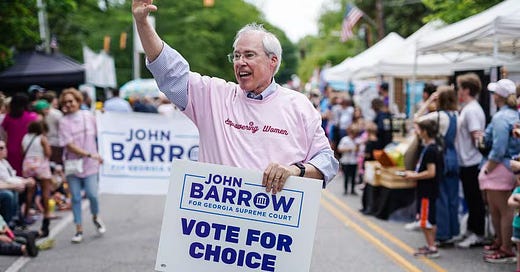Opinion: Is there something wrong with Georgia's judicial selection process?
High court race shines light on how its members are chosen
John Barrow is trying to do something that hasn’t been done in a century.
The former congressman hopes to defeat a sitting member of the state’s highest court for the first time in modern Georgia history with a campaign centered around reproductive rights.
But it’s his campaign — and the response from his critics — that has many voters wondering if the state’s judicial selection process is fair.
One person likely to respond with the answer “no” is Congressman Barrow himself. The Democrat, who spent a decade representing east Georgia in Congress, has more or less been campaigning for a seat on the bench for the last five years.
So why is he just now appearing on the ballot?
It all started in 2019, when Barrow was planning to seek the seat of retiring Justice Robert Benham. But a quirk in Georgia law allows newly appointed justices to serve for two years before facing voters.
Benham ended up retiring before the end of his term, Republican Gov. Brian Kemp appointed his replacement, and that election never happened.
Barrow found himself in a similar dilemma the next year when Justice Keith Blackwell resigned early. Barrow and former Republican state Rep. Beth Beskin, who had also planned to run for Blackwell’s seat, unsuccessfully sued to try and force an election. (Beskin would go on to lose a race for a different seat on the court.)
Now 68 years old, Barrow hopes the third time will be the charm as he aims to unseat Justice Andrew Pinson, the court’s newest member who is roughly half his opponent’s age. The nonpartisan election will appear on both Democratic and Republican ballots in Tuesday’s primary.
Pinson, a 37-year-old father of three (dogs) was a judge on the state court of appeals before earning a promotion to the high court from Gov. Kemp. Before that, he was a law clerk for U.S. Supreme Court Justice (and fellow Georgian) Clarence Thomas and also worked in private practice.
As the country prepares to mark two years since the overturning of Roe v. Wade, Barrow is attempting to channel voter outrage over new abortion bans in what is being seen as a longshot bid. He has been trying to link Pinson to the 2019 “heartbeat” bill signed by Gov. Kemp.
It’s a tactic that mirrors liberal-leaning court candidates in other states.
But Barrow’s outspokenness on the issue has not gone unnoticed by Kemp, whose campaign committee has set aside roughly half a million dollars to spend on Pinson’s behalf. The governor himself now appears in a 30-second commercial where he seems to take Barrow to task for his abortion stances.
“We need judges who follow the law and uphold the Constitution, not more partisan politicians in the courtroom,” Kemp (a partisan politician) said in the ad, adding that Pinson is “a conservative voice we can trust.”
A group of former judges and lawyers signed a letter supporting Pinson and warned that Barrow’s “partisan” campaign could land him in legal hot water. State ethics rules prohibit judicial candidates from taking positions on issues that might come before the court.
“There’s no point in having elections if you can’t talk about what the elections are all about,” said an unapologetic Barrow, who claimed in a since-dismissed lawsuit that he was being deprived of his First Amendment right to free speech.
State supreme court races in Georgia usually fly under the radar — or don’t happen at all — because the selection process gives new members time to get their feet wet. So by the time their election rolls around, they already have a judicial record and the resources needed to run as an incumbent.
But can that process continue to be fair to Georgia voters in an era when judges are increasingly viewed as political figures and public confidence in the judiciary is at a record low? Judicial candidates being required to leave voters in the dark as to their views will do little to rebuild that trust.
We have seen several top state Republican officials encouraging voters to support Justice Pinson. Anti-abortion groups such as Frontline Policy Action have also been donating to his campaign. This raises the question: is their support for the incumbent rooted in wanting to maintain an impartial court or to advance their own political causes?
A Barrow win would not change the overall balance of the court, with seven of the eight remaining justices having been appointed by Republican governors.
Regardless of the result, only time will tell if there are still any distinctions between partisanship and impartiality as courts become inherently political bodies.



